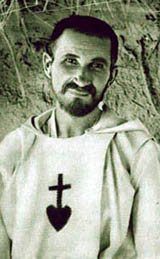Classic DACB Collection
All articles created or submitted in the first twenty years of the project, from 1995 to 2015.De Foucauld, Charles Eugène (B)

Charles Eugène de Foucauld was a Christian hermit among the Muslim Tuareg tribes of North Africa. Born in Strasbourg, de Foucauld discovered his missionary calling after living the dissolute life of a French aristocrat and soldier. His spiritual quest began during a scientific visit to Morocco, where he was moved by the simplicities of sincere Muslim piety. The French Abbé Huvelin, spiritual director of several French intellectuals, brought him to Christian faith and guided his choice of an ascetic life following a pilgrimage to Jerusalem in 1889. For seven years, de Foucauld lived as a Trappist in a remote Syrian village (1890 to 1897); then he left the order for the more arduous life of giving unpaid service to the convent of the Poor Clares in Nazareth and Jerusalem. Ordained in 1901, he devoted himself to what he called “Nazarene spirituality,” which found most austere expression in French Algeria. There he felt himself drawn by irresistible urge, first to the oasis of Beni-Abbes and finally to Tamanrasset in the Ahaggar Mountains, which was to be his spiritual home for the remaining eleven years of his life (1905 to 1916). He lived an uncompromising asceticism among the Tuareg tribes, who related to him as marabout (holy man), drawn less by his Christian creed and daily Eucharist than by his unspoken imitation of Christ, in which they recognized the Qur’anic portrayal of Isa (Jesus). In the estimation of the Tuareg chieftain who knew him best, his spirituality transcended the culture of French colonialism, which the tribesmen detested. His modern Muslim biographer, Ali Merad, asks whether, “though belonging to Christianity spiritually, the great hermit of the Sahara belongs in some way to Islam?” In answer to his question, he opines, “This fragile light was like a joyful sign of a fraternal presence.” In 1916 de Foucauld died at the hand of a young Tuareg tribesman in what was probably a tragic accident. He lies buried in Tamanrasset. The rule he devised was taken up in 1933 by the Little Brothers and in 1936 by the Little Sisters of Jesus. They maintain their spiritual center in Tamanrasset but also work in the poorest conditions of African and Asian cities. De Foucauld also had a profound spiritual influence on the French Catholic scholar of Islam, Louis Massignon (1883 to 1962), who in turn influenced the Second Vatican Council’s teaching on Christian-Muslim reconciliation.
David A. Kerr
Bibliography
R. Bazin, Charles de Foucauld: Explorateur du Maroc, Ermite au Sahara (1921; Eng. Tr., 1923).
M. Gibbard, “Charles de Foucauld,” in C. Jones and G. Wainwright, eds., The Study of Spirituality (1986).
E. Hamilton, The Desert My Dwelling Place: A Study of Charles de Foucauld (1968).
A. Merad, Charles de Foucauld au Regard de l’Islam (1975).
N. Robsinson, “Massignon, Vatican II, and Islam as an Abrahamic Religion, “ Islam and Christian Muslim Relations 2 (1991): 182-205.
R. Voillaume, Seeds of the Desert: The Legacy of Charles de Foucauld (1955).
This article is reproduced, with permission, from Biographical Dictionary of Christian Missions, copyright © 1998, by Gerald H. Anderson, W. B. Eerdmans Publishing Company, Grand Rapids, Michigan. All rights reserved.



